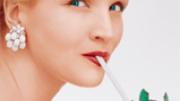The REincarnation of Harvard Medical School's magazine has arrived, sporting a glossy new look and now titled Harvard Medicine (it had been the Harvard Medical Alumni Bulletin). Mindful that "tampering with tradition can be tricky," dean and Walker professor of medicine Jeffrey S. Flier reminds readers that, at HMS, "we pride ourselves on building on foundations to enhance the future, not stand in its way." (Dr. Flier became dean in September 2007.)
The new issue features a special report on the five (potentially six) senses. In the section on vision, a brief article by Jessica Cerretani shows that people "may be more adept at identifying caricatures than faithful portraits" because a person's salient features—Angelina Jolie's lips, for example—are most likely to be remembered. In an ominous warning to Lady Gaga fans, and anyone else whose ears are regularly exposed to "the ear-splitting volume of rock concerts," Alyssa Kneller explains how this "auditory excess" may lead to life-long hearing damage. More disturbing is Ann Marie Menting's article about how Cambodian survivors of the Khmer Rouge's murderous revolution suffer "olfactory-induced panic attacks" when certain smells bring back horrific memories of "decaying bodies, gas-fueled pyres, and the sulfur and charred vegetation of mortar attacks."
The section on taste, however, has a pleasantly frivolous tidbit on a chocolate inhaler, which "shoots a chocolate mist into the mouth." An invention of McKay professor of the practice of biomedical engineering David Edwards, the inhaler provides "the pleasures of chocolate without the attendant calories." (Edwards has been featured in multiple Harvard Magazine articles, notably in "A Laboratory for Mixing Art and Science.")
But the most wondrous story is saved for last. In "The Sixth Sense," Allan J. Hamilton, M.D. ’82, tells of a patient who, in a planned cardiac arrest, was able to hear and remember the conversations of her surgeons. "By any clinical measure Sarah was dead," Hamilton writes. "Her body had cooled, her heart had stopped, her brain waves had disappeared. During her 17 minutes as a corpse, a surgical team worked quickly yet carefully to seal off her brain aneurysm." And yet when she was restored to life, she miraculously was able to recite to her astonished surgeons the details of their conversation held when she was, technically, dead. "It was utterly impossible, from a biochemical, metabolic, or physiologic point of view, for Sarah to have created any memories during her moments of suspended animation. Her brain had been devoid of any discernible electrical activity... We began our inquiry [into this phenomenon] with a vague, almost smug, scientific curiosity, confident we'd find an explanation for this mystery. But as rational explanations faded one by one, we began to wonder whether we had encountered something unique, wondrous even. Could we be looking at the neurophysiologic equivalent of the Holy Grail?"
Read Harvard Medicine's spring 2010 issue in PDF format.








